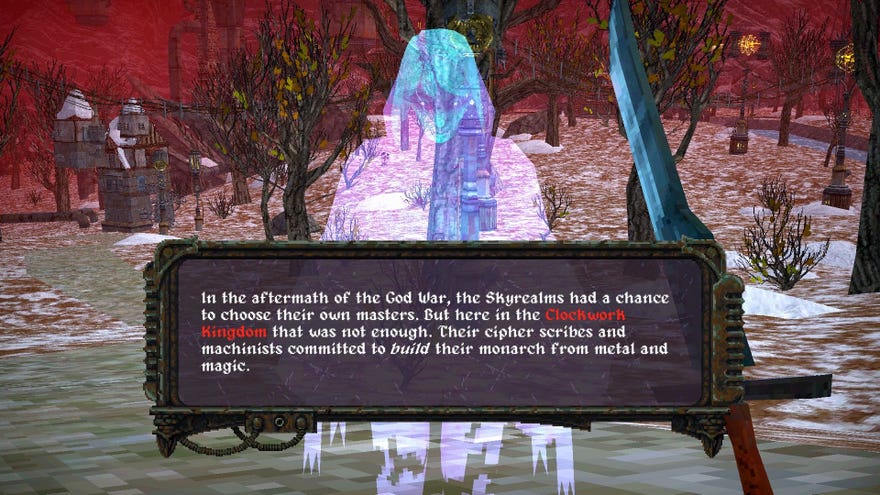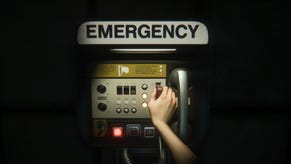Who needs a Morrowind remake when you can explore the beautiful nightmare of Dread Delusion?
Praise Paeguth
I booted up Dread Delusion and fell 30 feet to my death. This throwback first-person RPG is hazardous, and not only due to the dreamlike islands floating in the sky. My leg-snappin' plummet may be down to early access changes, causing the ground to be updated from right under my feet. Far from being a nuisance, meta-jank like this only endears me further to Dread Delusion. It is an RPG from the other side of some attic mirror, an Elder Scrolls from a parallel 2002. It has, somehow, slipped into our reality and is seeing its full release today. There are gods you can thank for this, but we dare not speak their names.
Everything about Dread Delusion leans into the trappings of the era it loves. The slopes are a little too steep, the textures a little too blown-up, or haphazardly applied. Enemies approach you like stiff marionettes, eager for blood but unable to expand their minds beyond petty swipes. Low fidelity slashing noises whiff through the hot pink air as they attempt to hurt you. You may feel like you have played this game before, but not quite. Look again at that creature. What the hell are they?
At the start of this story you are a prisoner, another tribute to Elder Scrolls. You are to be released, provided you hunt down and apprehend a notorious rebel known as Vela Callose. (You have a "one in three-hundred-and-sixty-four chance" of surviving this deed, your machine prison warden informs you). After an unsuccessful first encounter with the bandit, you are freed to go exploring, into an ambitiously dense world of skeletons, forgotten deities, and gigantic threshers rolling across the landscape on tank treads.
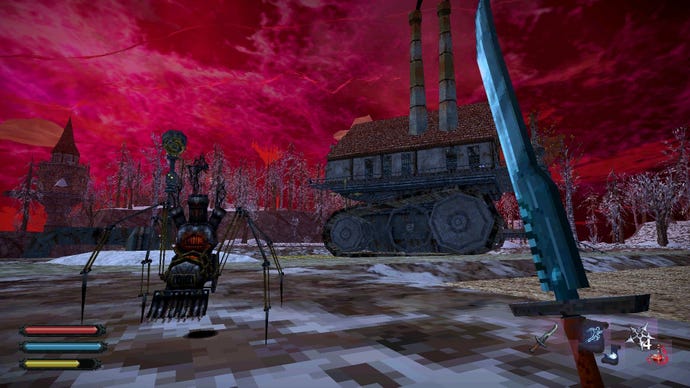
And exploring is the main verb here. There are mushroom-filled valleys, secluded castle keeps, big towns full of shops, manors, docks, skeevy taverns. What's most impressive is that all of these places are populated with peasants, tradesfolk, inquisitors, cultists, cutthroats... It's rare to find an NPC who doesn't have some small tidbit to say: a fear of the Union's soldiers, a complaint about the Clockwork King's madness. Early on you may find a gang of cartographers who rope you into helping them make a reliable map of these Oneric Isles. Another crowd of skulduggerers want help activating magical contraptions that allow travel across vast distances. You know what to do.
The aforementioned map is pleasantly shonky and uncooperative. It needs to be filled in as you go by marking landmarks in a big book (you get a quiet pop-up when a "location of interest" is nearby). Cataloguing those landmarks steadily reveals new sections of the map (but I still sorely needed a compass to navigate). And when quests are given, you'd be wise to remember what people say. Often I'd accept a quest but then dander off to an entirely new place, only to return afterwards and be treated to that magical sense of 90s game disconnection. Random little events I can't quite piece together. The wackiness of a past eon of jumblesome RPGs.
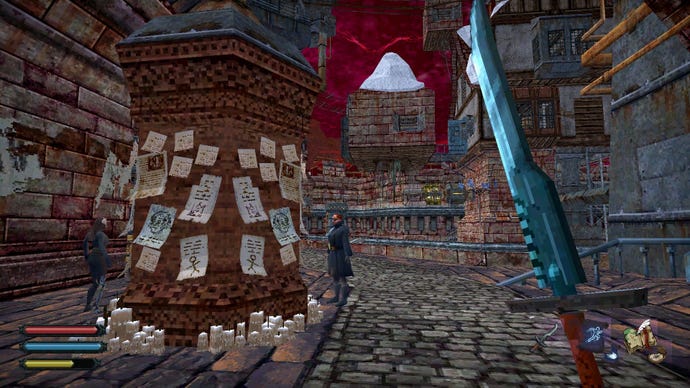
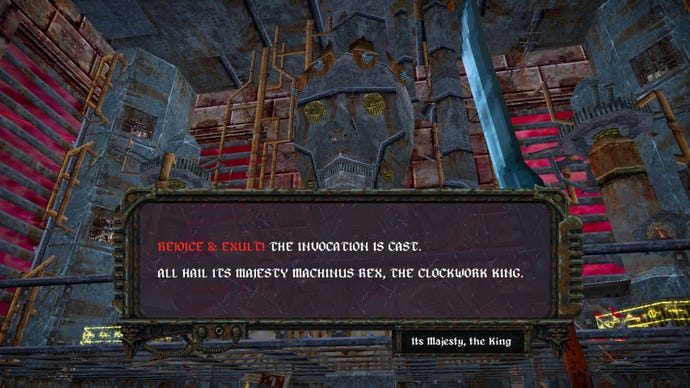
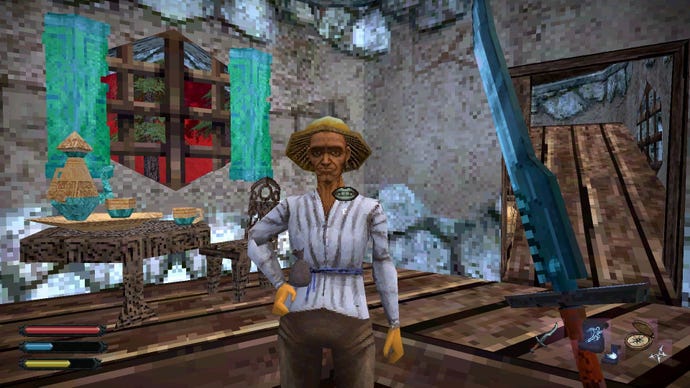
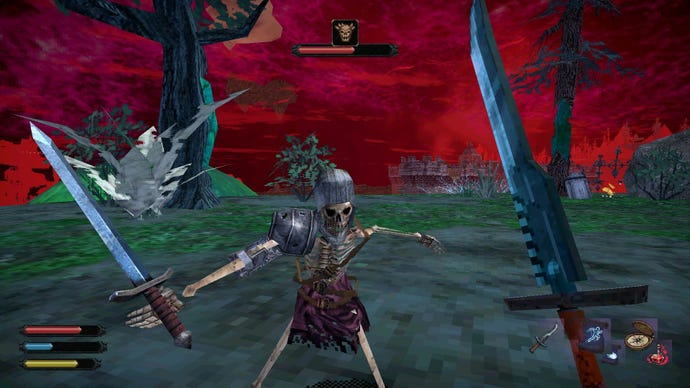
That's not to say you can't keep track of quests (the journal does help... a bit) but in general you do need to approach Dread Delusion on its own terms; as a creature from beyond. It's filled with imaginative and expressive world-building you don't always get in current-day blockbusters. The trade-off for such an ambitious undertaking by a small team can be felt in the typos, bugs, and quirks of texture. But while such glitchiness might be incongruous in any other game, here it only adds to the sensation of playing the fucked-up Morrowind of another timeline. There is a spell that lets you run like billy-o and survive huge falls (albeit with a sliver of health) and it leads to some bizarre movements and shortcuts as you tumble from isle to isle, seeking the fastest route to your destination, completely ignoring the hellish, winged idiots that chase you as you pass.
For a fan of wandering who was disappointed when Bethesda's usual reliable flair for exploration was lost in Starfield's loading screens and grey moons, I am buoyed by the very existence of Dread Delusion. It feels like both an expedition into warped video game history and a reassurance that games can still be weird and ambitious and faulty and gorgeous.
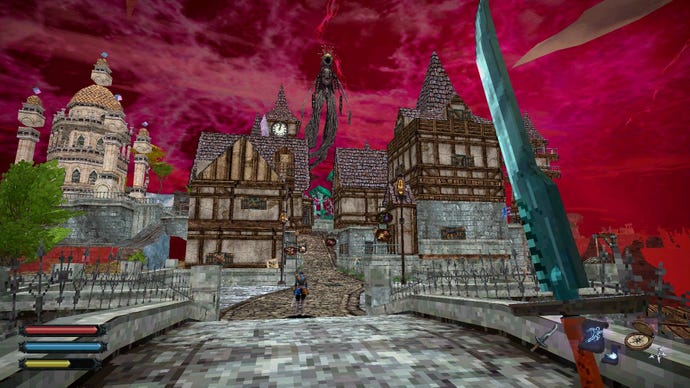
You can choose to play as I often have: a pioneering mapmaker in a world that is slowly decaying in the pink heat of its oppressive "neuron star". Or you can be a right bruiser, gunning from town to town and two-timing the various factions with "choices matter" mischief. Install an elder god as invisible overseer to a bustling market town. Change the settings of a clockwork auto-serf from "militant agriculture" to "benevolent agriculture". Pledge your assistance to the Machinist's Guild, promising to cleanse the monarch's broken mind, but then betray the conspirator's trust by selling them out to the King's Speaker. (Why did you trust me, Aphra? You IDIOT.)
It is a must-play for fantasy RPG fans who value colour, ambition, freedom, and a certain amount of jank. There's an infamous moment in Morrowind (one of our reader's favourite RPGs of all time) where a screeching elf falls from the sky and donks himself to death on the road ahead of you. When you inspect his body, you find a curious parchment, titled "Scroll of Icarian Flight". Curious players will use to scroll and find themselves leaping thousands of feet into the air. Dread Delusion is a loving tribute to that same sensation of reckless discovery, that same giddy feeling as you fall, laughing, to your death.
